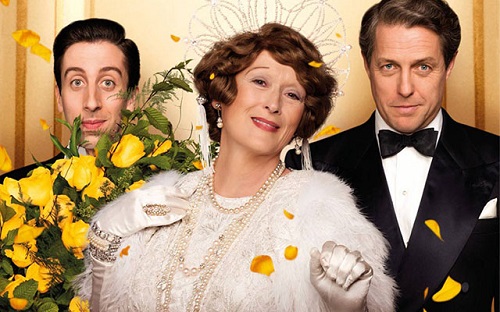Biopics may be the hardest reviews to write — trying to find a balance between catering to those familiar with the subject and enlightening those who aren’t. When it stars Meryl Streep, there’s no doubt the film will find an audience. Let’s face it, when is she ever not good? Unfortunately, it feels like lately she’s been pandering to her fans by providing her typical stellar performances in some rather lackluster films — Suffragette, Ricki and the Flash, Into the Woods, August: Osage County, and The Iron Lady. Even if it’s unintentional, they all seem like Oscar bait and even as the titular Florence Foster Jenkins, it’s all just more of the same.
What makes it sad this time is that it comes from director Stephen Frears who knows how to make damn good cinema: Philomena, The Queen, Mrs Henderson Presents, Dirty Pretty Things, High Fidelity, The Grifters, and Dangerous Liaisons. With the help of the supporting cast — Hugh Grant and Simon Helberg — they manage to make Florence Foster Jenkins better than the snoozefest it could have been. Even if the final product still feels more like a mere blip on all of their resumes.
It’s 1944 in New York City, and Jenkins is living the high life alongside her thespian husband St Clair Bayfield (Grant). They both do everything they can to help the arts — especially music — performing at The Verdi Club because Florence believes that music matters, especially during times of war. While never letting her 50 years of dealing with syphilis keep her down, she comes up with the idea to perform an opera — what she doesn’t know is that she can’t sing to save her life. Pianist Cosme McMoon (Helberg) is brought in to accompany her as she prepares for the performance of a lifetime, while Bayfield does everything he can to keep the New York Post’s Earl Wilson (Christian McKay) from revealing how terrible she actually is.
If Florence Foster Jenkins could have used a little more of anything, it would be a heartbeat. Not to say that we never care for poor unwitting Florence, but the film just moves along without much of a skip in its step — something a movie about music needs. The cast all perform as expected, with Helberg being the standout mainly because he’s so much more likeable here than in any single episode of The Big Bang Theory. He really can play characters besides Howard Wolowitz and he nearly steals the movie right out from under Streep. How’s that for an accomplishment.
Grant is dapper as always, although his subplot of having a girlfriend on the side — played by an underused Rebecca Ferguson — makes it hard to care for how much he does seem to love Florence, while doing everything he can to protect her from harsh realities. But the film is way too slow to be as entertaining as it should be, and it’s never as funny as expected. It’s all just lots of reaction shots as the next person bears their way through her offkey performance. Streep fans will have a great time watching her bring yet another real character to life, and those who know the story will get a kick out of it unfolding up on the big screen.
For everyone else, we’re all stuck waiting for the film to limp its way to end credits where all we can do is shrug and say, “At least Streep was good.” But she deserves better than this and here’s hoping that she can find a stronger output for all the years she clearly has left in her.










